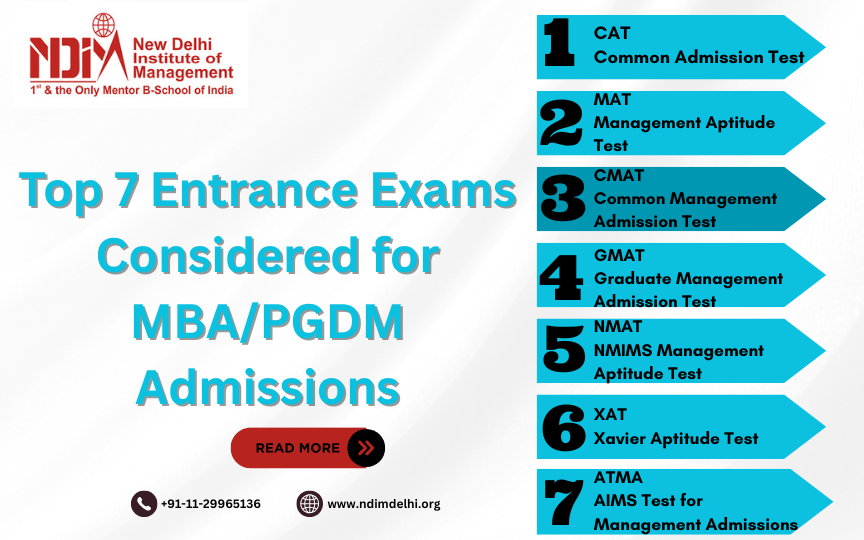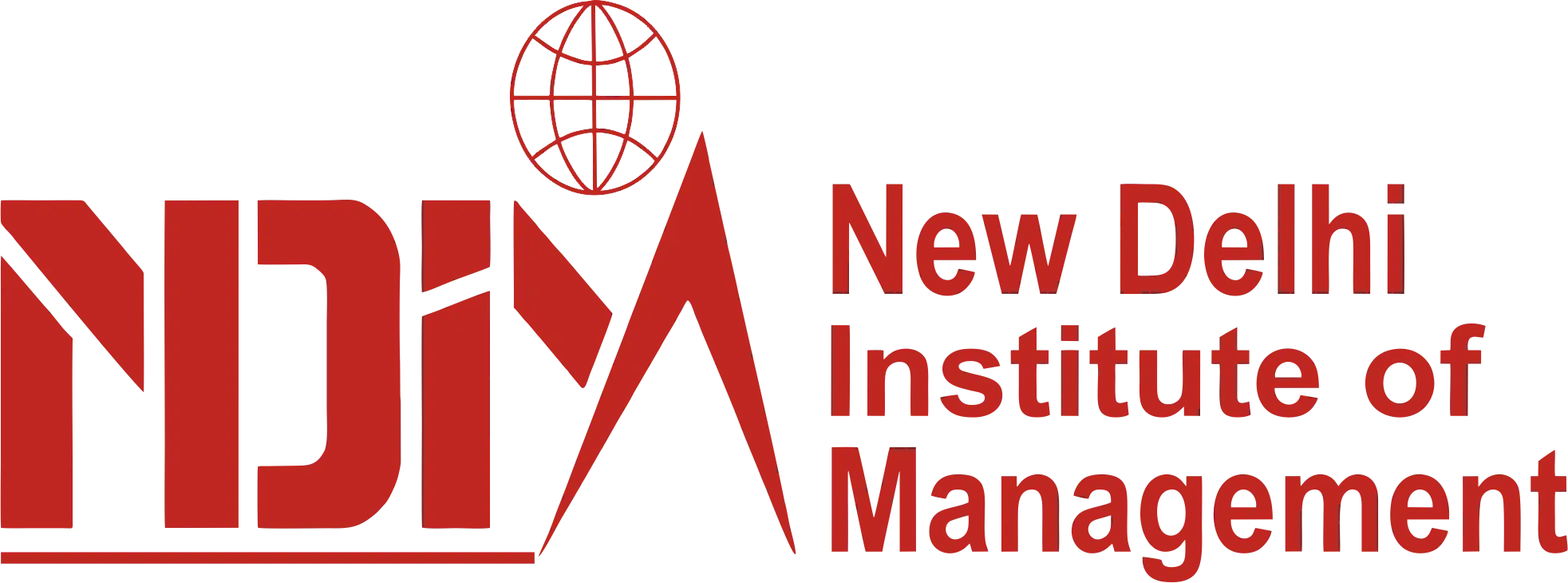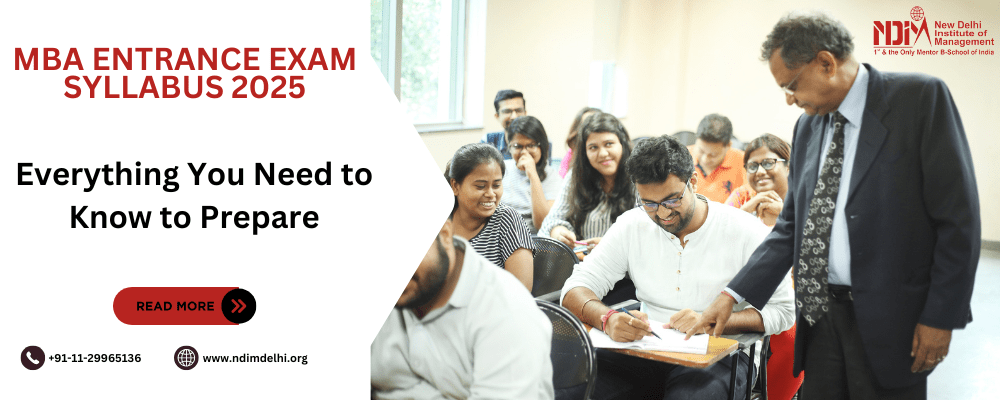MBA Entrance Exam Syllabus 2025 Overview
Thinking about getting your MBA in 2025? The very first thing you need to do is understand what’s on the entrance exam. These exams are a huge part of getting into business school, and you’ll need to study hard for them. This guide will give you a clear look at what to expect on the 2025 MBA entrance exams, tell you what subjects to focus on, and share the best ways to prepare.
Whether you’re hoping for a spot at a top school like the IIMs or a great private university, knowing the exam syllabus inside and out will give you a big head start. Let’s get into everything you need to know to begin!
Application Invited for PGDM 2025 at NDIM
Overview of MBA Entrance Exams in India
In India, the MBA entrance exam is a highly competitive and crucial hurdle for anyone aiming to get into various MBA programs. Different business schools and organizations conduct their own exams, each with its unique syllabus and structure. Some of the most well-known exams include the CAT (Common Admission Test), XAT (Xavier Aptitude Test), and MAT (Management Aptitude Test).
While each exam has its specific quirks, they generally test similar core subjects. You’ll typically find sections on Quantitative Aptitude (math skills), Verbal Ability (English language skills), Logical Reasoning (problem-solving), and often General Awareness (current events and general knowledge).
To prepare effectively, you’ll need to dive deep into the syllabus for your chosen exams and create a study plan that covers all the important topics.
Common MBA Entrance Exams
If you’re aiming for an MBA in India, you’ll encounter several major entrance exams, each leading to different respected institutions. Here are the most widely recognized ones:
- CAT (Common Admission Test): This is the flagship exam, conducted by the Indian Institutes of Management (IIMs). It’s often considered the most competitive and prestigious for MBA hopefuls in India.
- XAT (Xavier Aptitude Test): Administered by XLRI, XAT is known for its challenging questions, which heavily assess your analytical and reasoning capabilities.
- MAT (Management Aptitude Test): Accepted by a multitude of management schools across India, MAT offers the flexibility of both paper-based and computer-based testing.
- CMAT (Common Management Admission Test): Conducted by AICTE, CMAT scores are widely accepted by numerous universities throughout India.
- SNAP (Symbiosis National Aptitude Test): If your sights are set on an MBA program at Symbiosis International University, SNAP is the required entrance exam.
- NMAT (Narsee Monjee Management Aptitude Test): The Graduate Management Admission Council (GMAC) conducts NMAT. It’s used for admission to MBA and other management programs at NMIMS (Narsee Monjee Institute of Management Studies) and various other business schools in India.
Each of these exams will have a syllabus with some overlap, but it’s essential to know the specific syllabus for each exam you plan to take.

Detailed Syllabus Breakdown for MBA Entrance Exams:- Let’s break down the key topics that are commonly covered in MBA entrance exams for 2025:
1. Quantitative Aptitude:-Quantitative Aptitude is one of the most challenging sections for many MBA aspirants. It tests your numerical and mathematical abilities. Some common topics include:
- Number Systems
- Profit and Loss
- Speed, Time, and Distance
- Averages and Percentages
- Ratio and Proportion
- Simple and Compound Interest
- Algebra
- Geometry
2. Verbal Ability & Reading Comprehension :- This section tests your ability to understand and interpret written material. Key areas include:
- Grammar & Sentence Correction
- Synonyms and Antonyms
- Vocabulary
- Reading Comprehension
- Para Jumbles
- Sentence Completion
It’s important to improve your reading speed and comprehension skills to perform well in this section.
3. Data Interpretation & Logical Reasoning:- Logical Reasoning and Data Interpretation (DI) assesses your ability to analyze and interpret data and apply logical reasoning. Topics include:
- Bar Graphs, Line Graphs, Pie Charts
- Tables
- Data Sufficiency
- Logical Puzzles
- Blood Relations
- Seating Arrangements
This section requires good analytical skills and quick thinking.
4. General Awareness:- While General Awareness may not be as technical as other sections, it is equally important. This section covers:
- Current Affairs
- Business Awareness
- Economics and Finance
- International Affairs
- Sports, Entertainment, and Politics
It’s essential to stay updated with current events and business trends to excel in this section.
5. Business Awareness:- This is another area where you need to have knowledge about the business world, especially regarding:
- Economic Policies
- Corporate Affairs
- Management Practices
- Market Trends
- Company Reports
Detailed Syllabus Breakdown with Entrance Exams
📘 CAT Exam Syllabus
The CAT exam comprises three sections:
- Verbal Ability and Reading Comprehension (VARC): Focuses on reading comprehension, grammar, vocabulary, and sentence correction.
- Data Interpretation and Logical Reasoning (DILR): Tests data analysis, logical reasoning, and interpretation skills.
- Quantitative Aptitude (QA): Covers topics like arithmetic, algebra, geometry, and number systems.
📘 XAT Exam Syllabus
The XAT exam includes:
- Verbal and Logical Ability: Reading comprehension, verbal reasoning, and English usage.
- Quantitative Ability and Data Interpretation: Mathematical problems and data analysis.
- Decision Making: Ethical decision-making and situational judgment.
- General Knowledge: Current affairs and general awareness.
📘 SNAP Exam Syllabus
The SNAP exam assesses:
- General English: Reading comprehension, vocabulary, and grammar.
- Quantitative, Data Interpretation & Data Sufficiency: Mathematical problems and data analysis.
- Analytical & Logical Reasoning: Logical reasoning and problem-solving.
📘 NMAT Exam Syllabus
The NMAT exam includes:
- Language Skills: English language proficiency.
- Quantitative Skills: Mathematical problems and data analysis.
- Logical Reasoning: Logical reasoning and problem-solving.
📘 CMAT Exam Syllabus
The CMAT exam covers:
- Quantitative Techniques & Data Interpretation: Mathematical problems and data analysis.
- Logical Reasoning: Logical reasoning and problem-solving.
- Language Comprehension: Reading comprehension, vocabulary, and grammar.
- General Awareness: Current affairs and general awareness.
- Innovation & Entrepreneurship: Entrepreneurial mindset and innovation.
📘 MAT Exam Syllabus
The Management Aptitude Test (MAT) is a national-level exam conducted by the All India Management Association (AIMA). The MAT exam evaluates candidates on various skills essential for a successful career in management. Here’s a breakdown of the MAT exam syllabus:
- Language Comprehension:
- Reading Comprehension: Understanding and interpreting passages.
- Grammar: Sentence correction, error spotting, and parts of speech.
- Vocabulary: Synonyms, antonyms, and word meanings.
- Para Jumbles: Arranging sentences in the correct order.
- Sentence Completion: Filling in the blanks with the correct words.
- Mathematical Skills:
- Arithmetic: Percentages, ratio and proportion, profit and loss, time and work, time-speed-distance, averages.
- Algebra: Linear equations, quadratic equations, inequalities.
- Geometry: Properties of shapes, mensuration.
- Number System: Divisibility rules, factors, multiples, LCM, HCF.
- Data Interpretation and Sufficiency: Interpretation of data in tables, graphs, and charts.
- Data Analysis and Sufficiency:
- Data Interpretation: Bar graphs, line graphs, pie charts, and tables.
- Data Sufficiency: Identifying whether the provided data is enough to answer a given question.
- Intelligence and Critical Reasoning:
- Logical Reasoning: Blood relations, syllogisms, arrangements, analogies, coding-decoding, puzzles, and sequencing.
- Critical Reasoning: Identifying assumptions, drawing conclusions, and evaluating arguments.
- Indian and Global Environment:
- General Knowledge: Current affairs related to politics, economics, sports, and entertainment.
- Business Awareness: Trends in the business world, companies, industries, and the stock market.
- International Affairs: Major global events, international relations, organizations.
- Social Issues: Awareness of societal, environmental, and technological issues affecting the world.
Preparation Tips for MBA Entrance Exams
Now that you’re familiar with the syllabus, let’s look at some key preparation tips to help you ace your MBA entrance exam:
- Start Early: Don’t wait until the last minute! MBA entrance exams demand consistent effort and time, so beginning your preparation well in advance will allow you to cover all topics thoroughly.
- Target Strengths and Weaknesses: Figure out what you’re good at and where you struggle. Spend extra time on your weaker areas, but make sure you don’t neglect your strengths either.
- Practice with Past Papers: Solving previous years’ exam papers is a fantastic way to understand the exam pattern and the kinds of questions you’ll face.
- Take Mock Tests Regularly: Mock tests are crucial for boosting your speed and accuracy. They mimic the actual exam environment and are great for practicing time management.
- Stay Updated with Current Affairs: Make a habit of reading newspapers and magazines daily. This will be a big help, especially for the General Awareness and Business Awareness sections.
- Choose the Right Study Material: Pick high-quality study materials, ideally from reputable publishers or coaching institutes. Online courses and study groups can also be excellent resources.
Top MBA Colleges in Delhi for 2025
Delhi boasts some of India’s most highly-regarded MBA institutions. Here are a few of the top choices you might consider:
- Indian Institute of Management, Rohtak (IIM Rohtak): While not directly in Delhi, IIM Rohtak is located within the National Capital Region (NCR) and is a prominent IIM sought by many Delhi-based aspirants.
- Faculty of Management Studies (FMS), University of Delhi: Known for its excellent return on investment and strong placements, FMS is a highly coveted institution.
- Management Development Institute (MDI), Gurgaon: Situated in Gurgaon (also part of the NCR), MDI is a top-tier business school recognized for its rigorous programs and industry connections.
- Jamia Millia Islamia (JMI): This well-established university offers a respected MBA program with a strong academic foundation.
- International Management Institute (IMI) Delhi: As one of India’s first corporate-sponsored business schools, IMI Delhi offers quality management education and good placement opportunities
These institutions provide high-quality education, valuable industry exposure, and excellent career placement prospects. If you’re looking to pursue an MBA in the Delhi-NCR region, these colleges should be at the top of your list.
NDIM Delhi: A Top Choice for MBA Aspirants
NDIM Delhi (New Delhi Institute of Management) stands out as a premier MBA college in the capital, with a rich 33-year legacy of providing world-class education. It’s recognized for its exceptional faculty and modern, state-of-the-art infrastructure. NDIM is also known as a tech-enabled B-School, holding approvals from both AICTE and CII, emphasizing practical learning alongside theoretical knowledge.
NDIM focuses on holistic development, ensuring its MBA program thoroughly prepares students for the demands of the corporate world. The programs are designed to offer significant practical exposure through valuable internships, insightful guest lectures, and essential industry visits. The college also prides itself on an excellent placement record, with its students consistently securing positions in top multinational companies.
How to Enroll at NDIM Delhi
Getting admission into NDIM Delhi is a streamlined process. Follow these steps to get started:
- Visit the Official Website: Begin by accessing NDIM Delhi’s official website.
- Complete the Application Form: Go to the admissions section and fill out the online application form with accurate details.
- Upload Required Documents: Submit all necessary documents, including academic certificates, a valid photo ID, and a recent passport-sized photograph.
- Entrance Exam Scores Accepted: NDIM accepts scores from various management entrance exams such as CAT, XAT, CMAT, MAT, ATMA, GMAT, or other applicable state-level exams.
- Take the Entrance Exam (If required): If you haven’t already taken an accepted exam, appear for one as instructed on the website. Prepare thoroughly to perform your best.
- Group Discussion and Personal Interview: Shortlisted candidates will first participate in a Group Discussion (GD). Those who successfully clear the GD will be invited to appear for the Personal Interview (PI).
After completing these steps, you will be considered for admission to NDIM Delhi.
You can start your application process here: Fill the Application Form for NDIM Delhi
Conclusion
The MBA entrance exam syllabus for 2025 is extensive, designed to assess your analytical, verbal, and reasoning skills. A clear understanding of the syllabus and a strategic approach to preparation can significantly boost your chances of success.
If you’re aspiring to join a top MBA college in Delhi, NDIM Delhi is an excellent option. Known for its modern infrastructure, strong industry linkages, and seasoned faculty, NDIM Delhi continues to be a preferred destination for MBA aspirants.
Enroll now at NDIM Delhi and take the first step toward your successful career!
Download the MBA Entrance Exam Syllabus PDF: Download PDF
NDIM considers scores from national-level exams including CAT, XAT, CMAT, MAT, ATMA, GMAT, and relevant state-level MBA entrance tests.
Some of the major MBA entrance exams include:
CAT (Common Admission Test)
XAT (Xavier Aptitude Test)
MAT (Management Aptitude Test)
CMAT (Common Management Admission Test)
SNAP (Symbiosis National Aptitude Test)
NMAT (Narsee Monjee Management Aptitude Test)
The syllabus generally includes:
Quantitative Aptitude
Verbal Ability & Reading Comprehension
Data Interpretation & Logical Reasoning
General Awareness
Business Awareness
Topics include:
Number Systems
Profit & Loss
Time, Speed, and Distance
Averages and Percentages
Ratio and Proportion
Algebra & Geometry
Simple and Compound Interest
It assesses:
Grammar and Sentence Correction
Vocabulary (Synonyms/Antonyms)
Reading Comprehension
Para Jumbles
Sentence Completion
Common topics are:
Bar Graphs, Line Graphs, Pie Charts
Tables
Logical Puzzles
Blood Relations
Seating Arrangements
Data Sufficiency
Not all exams include it. However, exams like XAT, CMAT, and MAT often include:
Current Affairs
Business Awareness
International Affairs
Economics, Finance, and Politics
CAT: Emphasizes Verbal, Quant, and DI/LR.
XAT: Adds Decision Making and GK.
SNAP & NMAT: Focus more on speed, logical reasoning, and English.
CMAT: Includes an Innovation & Entrepreneurship section.
MAT: Broader with sections like Intelligence, Critical Reasoning, and Indian/Global Environment.
Start early and stay consistent
Focus on weak areas but revise strengths
Practice past papers and take mock tests
Stay updated with current affairs
Use trusted study material or coaching if needed
IIM Rohtak
FMS, University of Delhi
MDI Gurgaon
IMI Delhi
Jamia Millia Islamia
NDIM Delhi
Visit NDIM’s official website
Fill out the application form online
Submit entrance exam scores (CAT/XAT/CMAT/MAT/ATMA/GMAT)
Appear for Group Discussion and Personal Interview
Upload required documents and complete the admission process


